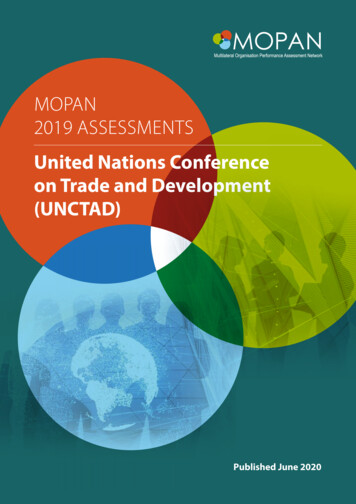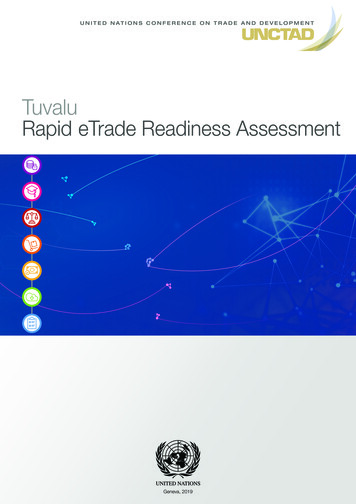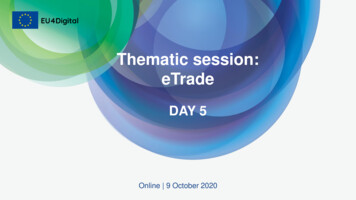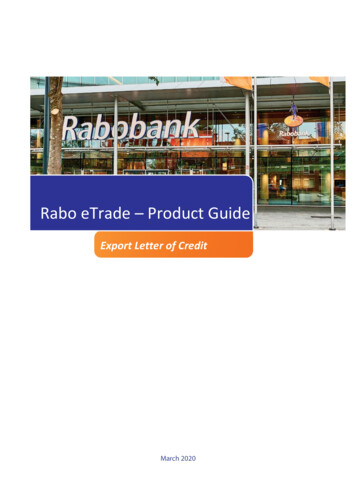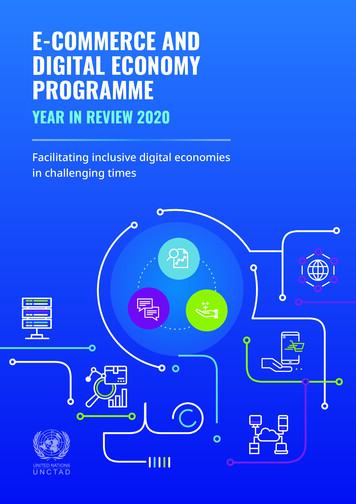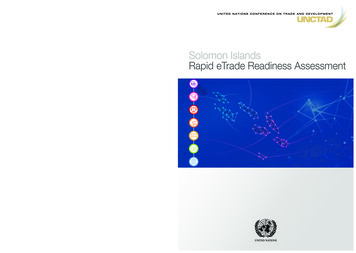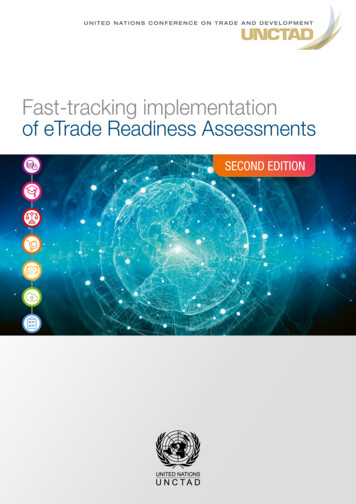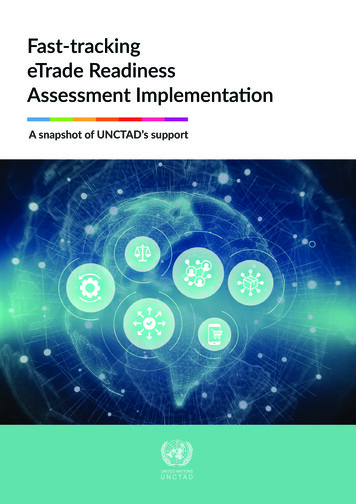
Transcription
Fast-trackingeTrade ReadinessAssessment ImplementationA snapshot of UNCTAD’s support
CONTEXTTHERE IS A GROWINGINTEREST FROM BENEFICIARYCOUNTRIES, DEVELOPMENTPARTNERS AND DONORSIN eT READY IMPLEMENTATIONSUPPORT ACTIVITIES.Born in 2017 as a spin-off from the eTrade forall initiative, the eTrade Readiness Assessments(eT Readies) provide countries with detaileddiagnostics and policy advice to foster anenabling environment and build sound e-commerce ecosystems in developing countries,particularly Least Developed Countries (LDCs).The number of eT Ready beneficiaries hasreached 29 in 2021. Most of them are LDCsbut there is a steadily increasing demand fromGovernments of other developing countries.There is also growing interest from the coredonors of UNCTAD’s E-commerce and DigitalEconomy (ECDE) programme — Germany, theNetherlands and Switzerland — in ensuringthat recommendations made are implemented.This demonstrates the relevance of the ECDEprogramme and usefulness of eT Readiesfor building institutional capacity acrossvarious stakeholders.The COVID-19 pandemic has given impetusto businesses and consumers to move onlineand to governments to faster embrace e-commerce and digital technologies; but it has alsoexacerbated pre-existing digital divides andbottlenecks, especially in LDCs. UNCTAD’s eTReady Implementation Support Mechanism(ISM) aims to support the implementation ofeT Readies recommendations. Such effortscan spur reforms and investments to helpdeveloping countries chart their way towardsa robust recovery from the COVID-19pandemic, leverage the potential of e-commerce and digital trade to meet the SustainableDevelopment Goals.
UNCTAD’S eT READYIMPLEMENTATION SUPPORTMECHANISM (ISM) IN A NUTSHELLBackgroundThe eT Ready ISM was put in place in 2020 primarily to reviewthe implementation of eT Ready recommendations in beneficiarycountries. Thanks to our network of eT Ready Focal Points andresource persons, we are able to keep track of progress, identifygaps and have an updated view on country priorities to furthertailor implementation support initiatives.The first implementation review in 2020 revealed that mosteT Ready beneficiary countries are taking follow-up actions,although at varying speed.Key takeawaysThe review helped to raise awareness about the need tofast-track the implementation of recommendations for greaterdevelopment impact. It underscored the need to increaseinter-ministerial coordination, public-private dialogue, andenhance development partners’ commitments for better policyplanning, identification of project priorities as well as theeffective mobilization of technical and financial support.Way forwardUNCTAD continues to monitor progress and act as a catalyst tosupport the implementation of priority recommendations uponrequest, tapping into available UNCTAD’s and eTrade for allpartners’ expertise, as well as in-country resources that can bemobilized in cooperation with a wide network of developmentpartners.
UNCTAD’S INTEGRATED OFFERON E-COMMERCE TO SUPPORTIMPLEMENTATION OF eT READYRECOMMENDATIONSConnecting the dots through multi-stakeholderdialogues and development partners’ roundtablesThe eT Ready ISM has access to a largepool of knowledge resources andexpertise, primarily available fromUNCTAD and eTrade for all partners. Inaddition, through connections with development partners in eT Ready beneficiarycountries, the ISM can leverage a widerange of resources via these networks.Based on countries’ needs and requests,targeted multi-stakeholder dialoguesand development partners’ roundtablescan act as enablers for better collab-oration, resources mobilization andscaled up support to accelerate theimplementation of eT Ready recommendations at the country and regional level.
Preparation of national and regionale-commerce strategiesUNCTAD assistance aims at shapingholistic visions at both national andregional levels, through inclusiveprocesses where public-privatecoordination and policy dialogueenable developing countries to harnesse-commerce for transformative andsustainable growth. eT Readies haveincreasingly triggered initiativesof countries and regional blocks toundertake e-commerce strategies,providing a sound diagnostic andimplementation plans.Digital government for business facilitationUNCTAD’s Business Facilitation programmehelps governments to map, simplifyand automate complex administrative procedures required toimport, export, create a business andobtain all necessary licenses to operatelegally. UNCTAD’s online singlewindows allow businesses to be fullyincorporated within hours rather thanweeks, and halve the steps required toobtain licenses. The programme helpsbusinesses to save significant time andmoney, boosting business creation andtrading activity, particularly for smalland medium entrepreneurs.
Capacity building for the production of statisticson the digital economyU N I T E D N AT I O N S C O N F E R E N C E O N T R A D E A N D D E V E L O P M E N TUNCTADManualstatisticians from developing countriesacross all the steps involved in the productionand dissemination of statistics related to e-commerce and the digital economy. UNCTAD’stechnical assistance in this area takes the formof regional and national trainings.Manual for the Production of Statistics on the Digital Economy 2020 Revised EditionThe new edition of the Manual for the Productionof Statistics on the Digital Economy can guidefor the Production of Statisticson the Digital Economy2020Revised EditionUNITED NATIONSFacilitation of cross-border e-commerce – implementation of theWTO Trade Facilitation Agreement (TFA) and other related agreementsThe WTO TFA and a number of regional andsub-regional trade agreements contain provisions on trade facilitation reforms such astransparency, pre-arrival processing, singlewindow, expedited shipments, transit andauthorized operators, among others. Thesecan assist facilitate a more agile and efficientcross-border e-commerce environment fortraders and consumers. National Trade Facilitation Committees (NTFCs) are coordinatingthe implementation of reforms in line withthe WTO TFA. UNCTAD provides capacitybuilding and training to stakeholders involvedon the implementation of such reforms, whilealso connecting NTFCs with stakeholdersinvolved in eT Ready implementation.
Facilitation of cross-border e-commerce —integrated support for efficient customs proceduresAs a mandatory hub for all cross-border tradedata, customs’ role in e-commerce cannotbe overestimated. UNCTAD’s ASYCUDAprogramme provides governments withautomated and integrated support inthe eight critical aspects identified by theWorld Customs Organization’s resolution onthe guiding principles for cross-border e-commerce, notably: Advance Electronic Data andRisk Management, Facilitation and Simplification, Legislative Frameworks, Safety andSecurity, Revenue Collection, Measurementand Analysis, Partnerships and Public Awareness, Outreach and Capacity Building.Enhancing countries’ readiness to dealwith e-commerce in trade negotiationsU N I T E D N AT I O N S C O N F E R E N C E O N T R A D E A N D D E V E L O P M E N TEngagement of developing countries in suchinitiatives, at bilateral, regional and plurilateral level, requires a thorough understandingof what is at stake for developing countriesin trade negotiations on e-commerce. Uponrequest, UNCTAD can assist with advisoryWHAT IS AT STAKE FORDEVELOPING COUNTRIES INTRADE NEGOTIATIONS ON E-COMMERCE?THE CASE OF THE JOINT STATEMENT INITIATIVEsupport, e-commerce-related servicespolicy reviews and other tailored-madecapacity building aimed at enhancing countries’ informed participation in such negotiations and analyzing the possible developmentimplications of various provisions included inthe e-commerce/digital trade chapters of tradeagreements.Geneva, 2021
Assistance on legal reformsUNCTAD monitors the adoption ofsupportive legal frameworks through theCyberlawtracker, and supports reformsaimed at building secure electronic interactions between businesses, consumers andpublic administrations. Support in this areacan cover the organization of regional andnational capacity-building workshops,law revisions, legal thematic studies andregional comparative reviews on e-commerce legislation.Strengthening competition and consumer protectionUNCTAD, as the focal point on competitionand consumer protection within the UnitedNations, provides technical assistance toimplement and review existing consumerprotection and competition policies andaccommodate the special features of thedigital economy. It also organizes capacitybuilding and awareness raising activitiesto empower government authorities,businesses, and consumer groups tothrive in open and fair digital markets.
Empowerment of women digital entrepreneursUNCTAD champions the eTrade for Womeninitiative, a second spin-off from the eTradefor all partnership. It aims at making womendigital entrepreneurs a force for inclusivewealth creation. Support in this area rangesfrom building skills to networking andcommunity development activities,inspired and supported by its eTrade forWomen Advocates. The initiative helpswomen digital entrepreneurs to buildmore inclusive ecosystems, including atthe local level.Skills developmentThe TrainForTrade programme (TFT)helps developing countries in buildingsustainable networks of knowledge,developing trade-oriented policies andpromoting ICT solutions and innovativethinking to enhance the capacities of international trade players, while supportingSouth-South and triangular cooperation.The e-commerce component covers issuessuch as the legal aspects of e-commerce,digital identity for trade and development, e-commerce best practicesand case studies.
In addition to UNCTAD’s in-house expertise we can leveragea wide range of support from 34 eTrade for all partners underthe following development solutions.The value of the eT Readies will be maximized only if countries implement the recommendations; experience so far has shown varying levels of efforts across countries. Thisbrochure has been prepared to help stakeholders involved in the eT Ready implementation process to match country policy and project priorities with assistance providedby UNCTAD and eTrade for all partners.Engage with us and we will try to find the most suitable solutionto respond to your specific country’s requests and needs!
UNCTAD/DTL/STICT/INF/2021/3 This publication has not been formally editedCONTACTMr. Alessandro VitaleeT Ready ISM CoordinatorUNCTAD – E-commerce and Digital Economy Branchalessandro.vitale@unctad.orgPrinted at United Nations, Geneva – 2204362 (E) – March 2022 – 150 – UNCTAD/DTL/STICT/INF/2021/3
request, tapping into available UNCTAD's and eTrade for all partners' expertise, as well as in-country resources that can be mobilized in cooperation with a wide network of development partners. The first implementation review in 2020 revealed that most eT Ready beneficiary countries are taking follow-up actions, although at varying speed.
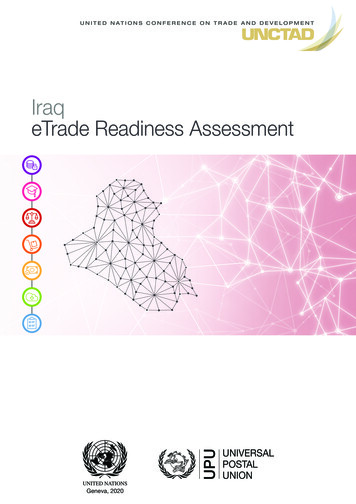
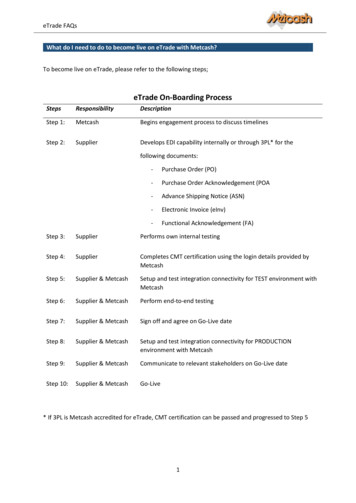
![Kenya: eTrade Readiness Assessment [ADVANCE COPY]](/img/24/dtlecdc2022d2-en.jpg)
